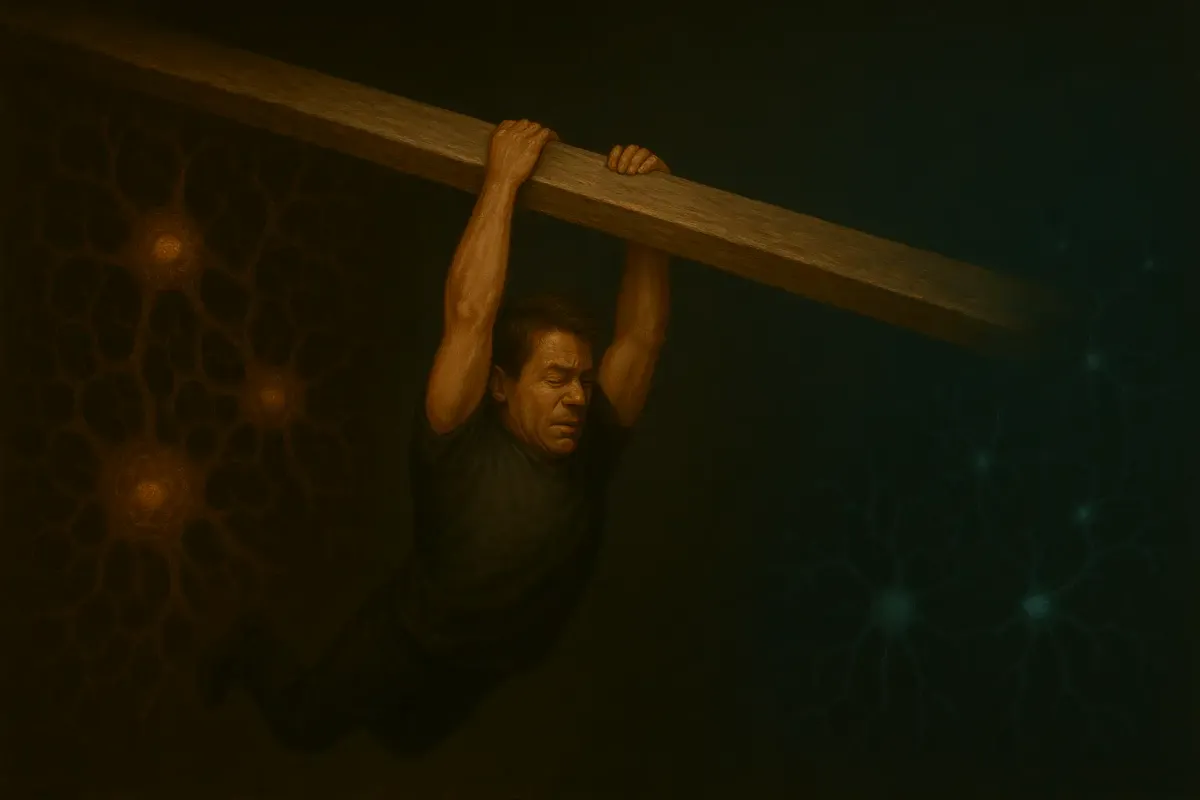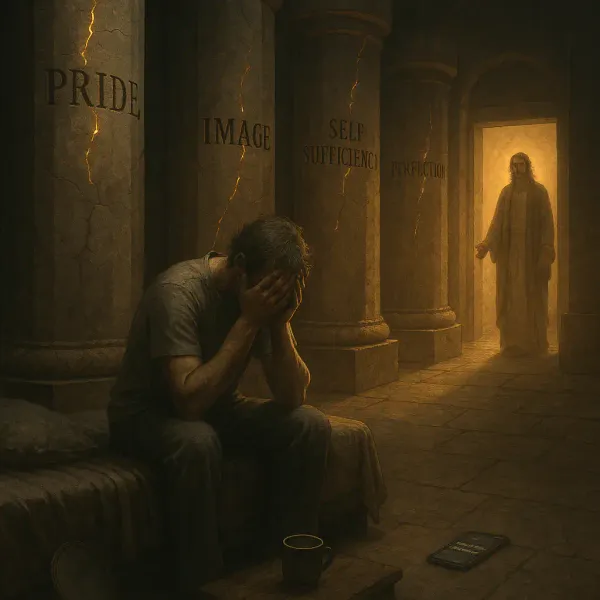When Certainty Cracks (Part 1 in the Changing Minds Series)
The gentle earthquake no algorithm can predict. What happens when a foundational belief cracks? I stayed; allowed scripture to read me. Did my faith survive?

The First Hairline Fracture
“I don’t know if I see it like that anymore,” he said, eyes steady, not defiant.
The words landed like a dropped glass. And though I didn’t say it out loud, something in me whispered …
Do I?
I remember that moment at my friend’s kitchen table, steam rising from mugs between us. We’d circled the same truths for years. That afternoon, the air changed — not in an argument, but in a new gravity neither of us named.
He went on:
“I’m not so sure whether I believe in an afterlife or even God anymore.”
It was a fracture, one I thankfully chose to stay with, interrogate, and work through.
Time passed and my friend walked away from faith. To this day, each time we talk on the phone (he moved to Ireland), his wife calls out to me in the background, “Talk to your friend!” — meaning convince him to find his faith again (if that’s a thing?).
It rarely arrives with a crash. More often, it’s a quiet shift you only notice the full impact of later — a hairline crack in something you thought was solid.
Belief Is More Than Facts
We imagine beliefs as separate ideas on a shelf, each evaluated on its own merits. But in truth, they’re more like tiles on a roof — supported by beams we don’t often see: lived experiences, relationships, memories, the language we pray in, the people we trust, the voices we listen to.
Psychologists Hugo Mercier and Dan Sperber call this “reasoning in practice” — the mind’s tendency to defend what our community already holds together.
When one tile shifts, the whole roof feels less certain.
That’s why changing a belief isn’t just swapping information.
It’s touching identity.
How Belief Holds: The Structure Beneath Conviction
Belief is not a loose collection of ideas—it is a structure. An intricately interwoven lattice of identity, story, relationship, and repeated experience. You can’t swap out one tile without shifting the beams beneath it.
Facts might inform, but they rarely reform, because the frame that holds them was built slowly, communally, experientially.
Cognitive science gives language to what the apostles practised. Our beliefs are not free-floating—they are held in networks, bound together by identity and reinforced by the people we belong to. Social cognition research confirms this: beliefs often function less like isolated propositions and more like interconnected nodes in a network, where changing one node of belief requires altering the supporting web around it (Sperber, 1996; Henrich, 2015).
A single “fact” is like a loose tile—it rarely changes the whole floor. But shift the structure beneath—relationship, trust, shared life—and the network itself begins to re-form.
Yes, sometimes personal crises, deep reflection, or Spirit-led conviction can spark change in isolation. Yet even then, lasting transformation is most often sustained when the person is grafted into a community that embodies the truth they’ve come to see, very much a "birds of a feather flock together".
The Apostolic Way of Entering the Crack
Paul knew this in Athens (Acts 17). He didn’t tear down their altar “to an unknown god” with clever rhetoric. He started with their longing. He stood alongside them in it, naming the God they sought without knowing, and pointing toward Christ.
The apostles didn’t treat doubt or rethinking as contaminants to be contained. They treated them as doorways. They walked through them with people — slowly, listening first.
You’ve probably seen the opposite. Churches gathered not around Christ’s life among them, but around the personality of Prophet X or Teacher Y—where the centre of gravity is a gifted individual rather than the whole body supplying what the other lacks (Ephesians 4:16).
Or bodies structured like corporations, decisions made in distant boardrooms by leadership who rarely break bread with the flock they shepherd. That is not how Paul related to the churches he planted—he wrote to them with tears, remembered their names, urged them on in love, yet never managed from a distance congregations with whom he had no direct relationship. Even when writing to churches he hadn’t planted, his care came through relational connection, not corporate oversight.
In other places, the scale itself makes depth impossible. Mega-churches where thousands gather but few are truly known, where relationship with leadership is necessarily shallow because the size forbids the intimacy needed for mutual correction and care.
Or orthodox traditions where rich liturgy orders the gathering, but the liturgy—not the living presence of Christ among His people—becomes the primary shaper of belief.
These expressions are not without good intent or good fruit; many are grounded in sincere devotion, biblical teaching, and moments of genuine pastoral care. God works through them.
Yet the question remains: are they formed and functioning with the same relational, apostolic DNA we see in the early church, or are they shaped more by the culture and structures of their age?
Why This Moment Matters
These cracks are rare and sacred. Our feeds and news cycles are engineered to paper them over — to rush us back to certainty, preferably a louder and angrier one. But a crack interrupts the loop. It creates space for humility. It invites the Spirit’s voice.
Here is where epistemic risk begins — not in being wrong, but in losing the ability to remain with the question long enough to be changed. If I seal the crack too quickly, I trade depth for closure, discernment for speed.
An Unhurried Companion
I’m not writing this as someone above the fray. I’ve patched over countless cracks far too quickly — with a well-timed sermon, a diversion, a quote, an answer that felt safe.
But the times I’ve stayed?
Sat with the questions?
Allowed scripture to read me?
Like the time I sat with the crack my friend's questioning of faith opened up?
Those are the moments my faith didn’t just survive uncertainty, it deepened.
They weren’t efficient.
They didn’t look productive.
But they made me more alive to Christ.
Paul never minimised the fractures in human thinking or the distortions of the age. Yet, like Abraham, he saw them not as proof that God had failed, but as the very reason to trust Him all the more. Faith was never meant to arise from perfect conditions — it grows in the soil of uncertainty.
A First Step
This week, notice the cracks.
- a conversation that unsettles you,
- a verse that sits differently this time,
- a thought you hesitate to say aloud.
Don’t rush to fix it.
Write it down.
Pray with it.
Share it with someone who listens more than they speak.
Let the crack breathe.
Sometimes that’s how the light gets in.
In the next part, we'll walk through the invisible hand that tips your scales.



